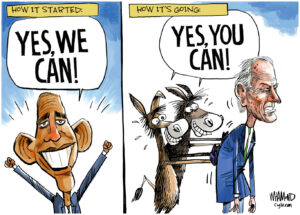A Star Wasn’t Born
What had been unexpected by the faithful at the Republican National Convention was McCain's choice of Alaska Gov. Sarah Palin as the vice presidential nominee. McCain's decision was cited as an example of his willingness to take a chance, to gamble everything on a hunch. It was much more than that.
The Republicans’ odd-couple ticket doesn’t look so odd when you consider the shifting populations of the battleground states that will decide the presidential election.
The top of the ticket, Sen. John McCain, accepted his nomination Thursday night with a speech laying out the broad theme of his campaign: the deeply patriotic, gutsy ex-prisoner of war against a well-meaning but hopelessly inexperienced Sen. Barack Obama.
This is putting a nice face on a reprehensible strategy that is likely to fail. Without actually invoking race, the Republicans are expected to remind uncommitted voters of the historic step they would be taking by voting for an African-American for president. Inexperience becomes one of the excuses for declining to make such a choice. McCain’s years of service become a reason for voting for him.
What had been unexpected by the faithful at the Republican National Convention, of course, was McCain’s choice of Alaska Gov. Sarah Palin as the vice presidential nominee. McCain’s decision was cited as an example of his willingness to take a chance, to gamble everything on a hunch. It was much more than that.
In her speech, Palin was grating, sarcastic — and misleading about her record. As Dahlia Lithwick, comparing Palin to an offensive right-wing commentator, wrote in Slate, “What we saw last night was the mainstreaming of Ann Coulter, the normalization of the principle that it isn’t bile when it’s spoken by a pretty woman.”
It’s hard to believe that Palin will wear well. Bile will be difficult to swallow for the remaining 60 days of the presidential campaign. But for the brief time of the Republican convention, the elevation of Palin seemed to make sense, at least to the McCain team.
First of all, she cowed the national media, now emerging as a top Republican target.
With investigative reporters up in Alaska digging furiously into Palin’s governorship and family life, Palin went on the offensive. “Here’s a little news for all those reporters and commentators,” she said. “I’m not going to Washington to seek their good opinion. I’m going to Washington to serve the people of this great country.” Along with this salvo, McCain’s aides relentlessly beat up on the media for questioning the official version of the Palin story.
It worked, at least for that night. Palin ended up as not only a heroine of the right but of the star-struck commentators she had scornfully kicked around.
“A star is born,” said CNN’s Wolf Blitzer. “A star is born,” said his CNN colleague, Anderson Cooper. “A star is born,” said Fox’s Chris Wallace. “A very auspicious debut,” said Tom Brokaw of NBC. Or as the Associated Press’ Tom Raum and Liz Sidoti wrote: “Sarah Palin delivered. An embattled vice presidential candidate, a novice on the national stage, the head of a family suffering its ‘ups and downs,’ the first-term Alaska governor rocked the GOP convention with a star-turning performance.”
More important than the Republican’s success in humbling the big-time media was her place in the party’s long-shot strategy to win the states that Pollster.com, a compiler of public opinion surveys, considers to be tossups. They are Montana, North Dakota, Nevada, Colorado, Ohio, Virginia, North Carolina, Florida and New Hampshire. Winning these states, where polling shows McCain and Obama running just about even, was the real reason for the Palin gamble.
An important theme of Palin’s speech was her praise of small-town America. “I grew up with those people,” she said. “They are the ones who do some of the hardest work in America … who grow our food, run our factories, and fight our wars. They love their country, in good times and bad, and they’re always proud of America. I had the privilege of living most of my life in a small town.”
But Palin, whose speech was written by top Republican strategists, was not really talking about small towns in the traditional sense. The Republican speechwriters know that this is no longer the America of the early- and mid-20th century, when the rural vote dominated national elections.
Rather, they are targeting the fast-growing “exurbs,” the far suburbs, where first-time home buyers have been creating communities and raising families. Important tossup states have such exurbs.
Exurbanites don’t really live a rural life, but they sort of do in the sense they are many miles from the city and are divorced from its concerns. They’ve tried to get away from it all. Republicans hope they will welcome the message from Palin, mother of five.
A conservative journalist, Steve Sailer, wrote an analysis in the American Conservative that helps explain her value in winning the exurban vote. Sailer analyzes population through the prism of race, which offends liberals but is useful for this election, for that’s undoubtedly how Republicans look at it. He found that the states with the highest white fertility rates tend to vote Republican. And those growing families are moving into the exurbs.
While the exurban strategy of targeting fertile white families worked for President George Bush, it is likely to fail for McCain-Palin because of the sinking economy.
The exurbs have been hard hit by foreclosures. Before the mortgage collapse, land developers were ripping up rural land in Florida, Virginia, Nevada, California and other states. Homes are now vacant. Those living there face high gas prices for their long commutes — and the ever-present fear of losing their jobs. Friday morning, the day after the Republican convention ended, the government reported that the national unemployment rate rose to 6.1 percent, the highest in five years. The New York Times said: “So far, 605,000 jobs have disappeared since January. The unemployment rate, which rose from 5.7 percent in July, is now at its highest level since September 2003.”
A star was not born at the Republican convention. Palin’s mean-spirited, smug performance may have pleased her right-wing audience, but it was not what the country wants to hear. Barack Obama’s message is much more suited for these tough times.
Your support matters…Independent journalism is under threat and overshadowed by heavily funded mainstream media.
You can help level the playing field. Become a member.
Your tax-deductible contribution keeps us digging beneath the headlines to give you thought-provoking, investigative reporting and analysis that unearths what's really happening- without compromise.
Give today to support our courageous, independent journalists.






You need to be a supporter to comment.
There are currently no responses to this article.
Be the first to respond.